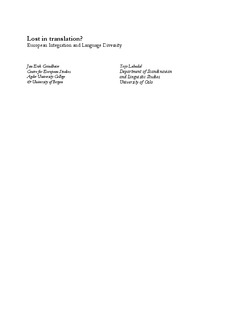Lost in translation? : European integration and lanuage diversity
Working paper
Permanent lenke
http://hdl.handle.net/11250/134861Utgivelsesdato
2006Metadata
Vis full innførselSamlinger
- CES Working Papers [28]
Sammendrag
English is constantly moving forward and elucidates its role as lingua franca in the European Union. At the same time the Union has 20 official languages and promotes around 150 regional or minority languages under its official motto United in diversity; expressing the view that each
member state should promote its national language and identity simultaneously as their citizens are to feel like Europeans. This can be looked upon as a contradiction in terms because diversity can juxtapose unity although in this paper we conclude the opposite by investigating the relationship between language, identity and the process of European integration. Taking as a point of departure the fact that language is a crucial part of our identity, we argue that language as such does not have to be an obstacle for the development of ‘an ever closer Union’ in Europe if the general discourses are made transparent on each level of political decision-making, i.e. the
regional, national and supranational level. We see the Union as the individual languages’ and hence identities’ advocate, defending a democratic diversity in Europe at the same time as three main working languages – English, French and German – are ensuring its necessary unity under some kind of confederal or federal supranational political system.
